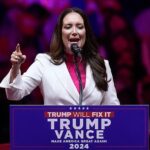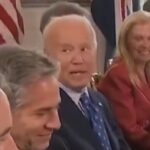Trump makes Serious FATAL ERROR during RAMBLING speech internet CATCHES IT, once again confirming what we are suspected
In recent days, former President Donald Trump has once again found himself at the center of controversy, but this time, it’s not just his usual polarizing rhetoric that’s making headlines. During a particularly rambling and incoherent speech, Trump made what many are calling a “fatal error,” a slip that has not gone unnoticed by the ever-vigilant internet. This gaffe has reignited discussions about his failed 2020 presidential bid and the current state of his public image.

Trump’s speech featured a peculiar mix of grievances and self-praise. At one point, he appeared to acknowledge that he lost the 2020 election, despite his previous, often vehement claims to the contrary. He said, “this was the last week in office for me because of a horrible, horrible election where I got many millions more votes than I did the first time but didn’t quite make it, just a little bit short.” This admission, whether intentional or not, is seen by many as a significant concession from Trump, given his persistent denial of the 2020 election results.
The internet, ever quick to scrutinize and analyze, has latched onto this moment as a glaring contradiction. For years, Trump has consistently asserted that the 2020 election was stolen, a narrative that has fueled numerous legal battles and political discourse. However, his recent comments seem to undercut that narrative, leading some to speculate whether Trump’s rambling could be a sign of waning conviction or a slip of the tongue.
The speech, however, wasn’t just notable for its apparent admission. It was also criticized for its disjointed and repetitive nature. Observers have noted that Trump’s recent rallies and speeches have taken on a monotonous tone, marked by repetitive themes and an overall sense of stagnation. This has led to accusations that Trump is becoming “stale,” with some comparing his speeches to a neighbor who incessantly runs a leaf blower — annoying and tiresome.
Furthermore, Trump’s rhetoric has increasingly focused on portraying the country as divided between “Real Americans” who support him and “Outsiders” who do not. This us-versus-them mentality is a classic political strategy, aimed at consolidating his base by stoking fears and fostering division. Trump’s claims that America will be richer and safer under his leadership are part of a broader narrative designed to appeal to his supporters’ sense of grievance and nostalgia.
In contrast, recent political events and speeches from other figures, such as Kamala Harris, have highlighted a different approach. Harris, in particular, is being positioned as a more forward-looking candidate who represents a new chapter for America. Her campaign is gaining momentum, with significant support in key swing states, while Trump’s support seems to be diminishing.
The criticisms extend beyond Trump’s speeches to his broader political strategy. Recent reports indicate that Trump and his allies are engaged in efforts to suppress votes in critical swing states, including legal challenges aimed at disenfranchising voters. This strategy, combined with Trump’s attempts to undermine confidence in the electoral process, paints a troubling picture of his approach to politics.
Moreover, Trump’s ongoing insults and divisive rhetoric have been widely criticized. His recent remarks about ethnic enclaves and immigrants have been described as offensive and counterproductive. This kind of rhetoric not only alienates potential voters but also reflects poorly on his overall campaign strategy.
As the political landscape continues to evolve, it is clear that Trump’s recent speech and his overall approach are under intense scrutiny. His rambling remarks, coupled with a strategy focused more on sowing division than on presenting coherent policies, suggest that his campaign is struggling to maintain relevance and support.
In summary, Trump’s recent public appearance has exposed both his tendency to make fatal errors and the growing disconnect between his rhetoric and the realities of American politics. As the 2024 election approaches, these issues will likely continue to shape the discourse and impact his political fortunes.





